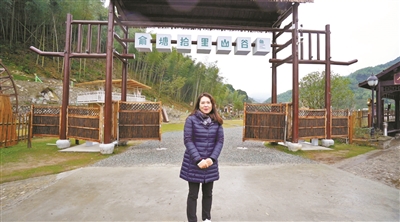
Julia poses at the gate of the “Yutang Ten-Mile Valley”. Photo by Cai Ke
On a windy day in early December, Julia Park from South Korea visited Yutang village in Dongqian Lake town, Yinzhou district of Ningbo under the invitation of Ningbo Evening News. Here she learned about traditional Chinese solar terms and farming culture dating back to the Song Dynasty (960-1279), experienced rice harvesting and savored local specialties. As part of the initiative of “Promoting Rural Revitalization, Aiming for Common Prosperity”, rural tourism was integrated with the poetry culture of the Song Dynasty at the village. Visitors can also experience the charm of this ancient Chinese dynasty from around 1,000 years ago.
Julia – currently an admissions representative at Georgia School (GSN) in Ningbo – has stayed in China for four years. Thanks to her schooldays mostly spent at international schools, she has developed an intense interest in diverse cultures and exploratory trips. She has been to Dongqian Lake for bike-riding and coffee with her family; however, this trip was Julia’s first time to visit Yutang village and experience the ancient Chinese farming culture.
Greeted by Yu Dongbo (deputy director of the local village committee), Julia was invited into a Song-Dynasty farm culture experience garden. Here, the simulated life and farming of local residents is demonstrated by following 6 traditional Chinese solar terms in spring: Lichun (Beginning of Spring) comes first among 24 solar terms, indicating the time for irrigation and topdressing for better growth of crops; this initiating term – together with Yushui (Rain Water), Jingzhe (Awakening of Insects), Chunfen (Spring Equinox), Qingming (Pure Brightness) and Guyu (Grain Rain) – suggests the starting of a farming round. People followed a variety of customs and health tips for different solar terms, some of which still work today. For instance, children would visit their parents on Yushui, crops would be irrigated on Chunfen and Qingtuan (the green rice dumpling) would be eaten on Qingming.
During the exploration in the experience garden, this South Korean lady was attracted by a wooden machine covered with threads and cloths. It is, as Yu introduced, a duplicate of the traditional loom where ancient Chinese people wove. Julia was further taught how to use the loom – two treadles are used to harness the two heddles for alternating the sheds, rendering an exciting and immersive experience learning traditional Chinese weaving techniques. Among other demonstrations were simulations of pottery and liquor-making techniques from the Song Dynasty, all experienced alongside stores with the Song architectural style.
Having explored the farm culture simulations, Julia approached the nearby rice field and obtained a chance to learn about rice collecting—holding the middle of rice stems with one hand, and using a sickle to cut stems from the bottom with another hand. For this quick learner, separating rice from the stems was also performed with a traditional Chinese mechanic tool.
Julia’s cultural and culinary trip ended with local villagers’ invitation to savor specialties. The prepared dishes included stewed pickled vegetables with freshly picked bamboo shoots, river shrimp, fish, and spicy braised chicken. During the meal, Julia also tried a local dish called pan-fried river snails that she had never eaten before. “It has a taste of mud. But indeed, tender and great,” exclaimed Julia. According to this GSN admissions representative from South Korea, similar food is also available in her hometown, but cooked differently. “It was really nice to visit this quiet village, only a 30-minute drive from the city center. I had a great day!”
The experience garden in Yutang village – as part of the rural tourism initiative – was officially opened in August 2022. Together with the farming culture simulations and the rice fields, a wide array of tourist facilities are available, including a trending camping base, a train-themed restaurant, and tourist boats along the river and ponds with koi carp and shrimp. The initiative to develop rural tourism has led to a new sustainable economic development model for villages in Ningbo and even across China.
Reporter: Mei Jie
Proofreaders:Hua Luxin, Lü Chang
Jason Mowbray


